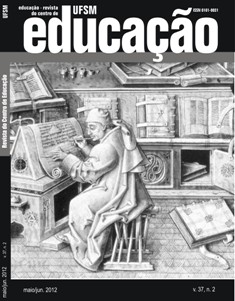Ethics in the medieval university: the importance of classics reading for the elaboration of Thomas Aquinas
DOI:
https://doi.org/10.5902/198464444410Keywords:
History of education, Medieval education, Higher Education, Reading and ethics, Thomas Aquinas.Abstract
This paper aims to present some considerations about the importance of reading to the development of the ethics conceptions of Thomas Aquinas (1224 - 5? / 1274). At the dawn of the thirteenth century, the townspeople of Medieval West created a new institution designed for knowledge and education: the University. In it, teachers and disciples were debating key issues for the new society using mainly texts of Ancient Philosophy and Christians, but also Arab and Jewish writings. The literacy forms used encompassed mainly lectio and disputatio , and counteracted by distinct theoretical bases, those thinkers eventually recreated the summa , in a original and fundamental form to the philosophical elaboration of that time. To discuss the importance of reading in the formulation of the concept of ethics in the medieval university, we will present some characteristics of the production of knowledge in the thirteenth century linked to its historical context and then discuss some ethical considerations of Thomas Aquinas, one of the most prominent authors of that period. Considering the limits of this article, only one text, “The object of charity” based on Aquinas major work, the Summa of Theology, will be discussed in depth. Preliminarily, it is possible to state that as well as the reading of classical authors by Thomas Aquinas and other masters of the thirteenth century, helped them develop knowledge about ethics conforming to their time, historical reading of these authors helps in the understanding of today.Downloads
Published
How to Cite
Issue
Section
License
Declaration of originality
We declare that all articles present in the journal Educação (UFSM) are originals and were not submitted for publishing on any other publication, as a whole or a fraction. We also declare that, after being published by Educação (UFSM), a paper will not be submitted to another journal within two years. After this time, our journal transfers the publishing rights to the authors, with a permit granted by the Editorial Council.
We also acknowledge that the originals’ submission to Educação (UFSM) implies on a transference of copyright for physical and digital publishing to the journal. In case of noncompliance, the violator will receive sanctions and penalties predicted by the Brazilian Copyright Protection Law (n. 9610, dated 19/02/98).
Attribution 4.0 International (CC BY 4.0)
This license lets others remix, transform, and build upon the material for any purpose, even commercially, and copy and redistribute the material in any medium or format.

This work is licensed under a Creative Commons Attribution 4.0 International (CC BY 4.0)






